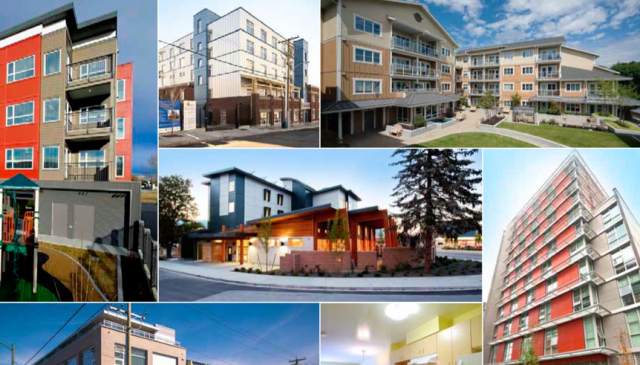Why providing affordable housing in Nelson is easier said than done
Most people in Nelson believe we need more housing for people who can’t afford market prices. Almost every candidate in the recent municipal election stated it as a priority, although they had few concrete suggestions.
Solutions to affordable housing can come from at least three directions: changes to the city’s zoning and regulation of existing residential housing, special deals the city makes with developers, or from the construction of entire buildings of affordable housing units.
Zoning
The city of Nelson recently changed its zoning bylaw to make it easier to build laneway housing, to subdivide lots, and to create suites in existing homes. In addition to aiding the city’s goal of increased density, these practices might contribute to affordability by increasing the volume of housing available in the city.
Incentives to developers
Council can also negotiate with developers of market condo housing, asking them to pay a fee to contribute to the city’s Affordable Housing Reserve Fund. For example, the developers of the ten condos to be built on Choquette Avenue will contribute $250 per unit to the fund.
The city’s affordable housing fund currently has about $12,000 in it.
Sometimes developers will make contributions like this in exchange for the city granting a variance or other regulatory change the developer wants.
A municipality can also negotiate with a developer to provide a certain number of units that will sell or rent at a price below market value, as has happened at Nelson Commons. That development will be providing three units that will sell below market value. In the case of a re-sale, those units must be resold the same way.
New buildings
Another approach is for a non-profit organization to collaborate with senior levels of government to provide an entire building of affordable units, like Anderson Gardens in Nelson, which is a project of the Canadian Mental Health Association (a non-profit organization), B.C. Housing (a provincial crown corporation), and the federal government.
Projects like Anderson Gardens require complex collaboration between multiple long-term partners.
“There is a lot of naiveté around affordable housing in the general population,” says Jenny Robinson, executive director of Nelson Cares Society, which operates several affordable housing projects in Nelson, for which there are long waiting lists for the 144 units.
“People really want to have affordable housing,” she said, “but (they don’t understand) the complexity of building it and operating it over many decades.”
Simply put, unless a building charges market prices for its units, a private developer can’t afford to build it. It has to be subsidized. Small municipalities like Nelson have no money for this, and sources of subsidy for housing are disappearing fast at both the federal and provincial government levels.
An eye-opening meeting
How to fund affordable housing is a big challenge for builders, architects, developers, bankers, non-profit groups, city planners and politicians.
A group of those players got together in late September in for Let’s Talk Housing, a meeting held in Nelson to try to come up with solutions. It was a collection of people who usually don’t end up in the same room.
“It opened my eyes to the point of view of people I would normally would not talk to, which is always a good thing in life,” said local contractor Ed Olthof, reflecting back on the meeting in a recent interview.
He said he learned about “the level of need, and the level of unaffordability that actually is out there. It is easy for people who are relatively solidly middle class to not really appreciate the hardships, however arrogant that may sound.
“Talking to people who are on the front lines of the less fortunate, that was the probably the biggest benefit. Until everybody has empathy for the problem, the problem won’t get solved.”
Peter Gosney, another contractor who attended the meeting, had a similar response. He said he had been unaware of the activities of Nelson Cares, and he also learned about other organizations around the table.
“There was one lady at our table (Joan Reichardt) involved with seniors at risk, and she had a wealth of knowledge about the subject. Some of the things she brought up are not the kinds of things I would have guessed—huge problems in the rural areas with people aging and struggling financially and physically. Coming into the meeting, I would not have thought of that.”
Gosney and Olthof said it is a common public perception that many of the homeless people in Nelson are transient youth. That perception stands in the way of public acceptance of the need for affordable housing, they said.
“But it came over loud and clear,” said Gosney, “that there is a huge percentage that carry mental health issues, and that complicates the issue and makes the solutions even more oblique. More affordable housing will not necessarily work because they may not be in an situation where they can deal with their own accommodation and the rigours of day to day life.”
“It was an enlightening meeting from the point of view of education,” he said, “and a bit daunting because the problem is worse than I thought.”
And that problem, everyone seems to agree, is money.
It boils down to money and partnerships
Some of the affordable housing in Nelson is self-sustaining, like Ward Street Place, owned and run by Nelson Cares and sustained by rents from tenants and from the businesses at street level.
Other sites are subsidized by B.C. Housing, like Copper Mountain Court and Cedar Grove Estates both in Rosemont, and Lakeside Place on Nelson Avenue. These are long-term agreements that cover the increasing maintenance costs as buildings get older.
“It has to happen in partnership and it needs multiple partners,” Robinson says.
“Anderson Gardens took eight years. It is not short term. You need to be really assured, as a non-profit, that you can make it work. You see the same thing with any kind of condo development, they are crunching numbers all the way along, so it is the same for non-profits. If you are going to charge a lower rent you need revenue from another source to help maintain the building over the long term.
“There is decreased support from the federal government, which has completely pulled out of housing,” says Robinson.
At the provincial government level, funding affordable housing falls to B.C. Housing, which provides housing developments, rental supplements, homeowner grants, emergency shelters, and assisted living arrangements for low income families, seniors, people with disabilities, women and children fleeing violence, and homeless people.
“There has been a political change over the last decade,” Robinson says. “They are moving away from these operating agreements. Before, you would sign a contract with them to build, they would give reasonable financing to the construction, they would grant for some of it, and you would bring in other players like the federal government, and then you would sign an operating agreement with BC Housing over the long term and sometimes these would be 30 up to 60 years, long term commitments.”
“Let’s just do something. . . “
Former city councillor Donna Macdonald, who headed of the city’s housing committee at the time, organized Let’s Talk Housing. She said the atmosphere was action-oriented.
“By the end of the night, everybody was saying, ‘Lets just do something, lets get something off the ground,’” she said.
“The builders were saying, ‘Tell us what you want and we will help you design it and we can build it,’ and the architects were saying, ‘Well, we can help design it if you tell us what you want, so lets just get going.’”
She said she expects the group will meet again, now that they have gotten to know each other.
Let’s get creative
At the Let’s Talk Housing meeting, facilitator Jada Basi presented some promising strategies emerging in other parts of the province– strategies that promise to break the log-jam described above. The Nelson Daily will look at some of those in a future story.
Notes and a list of participants from the Let’s Talk Housing are contained toward the end of the document attached below.
UPDATE: This story was updated on January 20, 2015, to correct inaccurate statements about how Nelson Commons will be contributing to affordable housing.
Related stories in The Nelson Daily
Up to 200 housing units needed for vulnerable groups in Nelson, says new housing report (December 1, 2014)
New zoning rules encourage more density and mixed use in Nelson (October 10, 2013)
City trades favours with developers to increase affordable housing (August 12, 2013)
Bill Metcalfe is a freelance journalist who covers Nelson City Hall for The Nelson Daily. To receive a regular twice-monthly email with links to his most recent city hall stories, send a request notification to billmet4@gmail.com.


























Comments